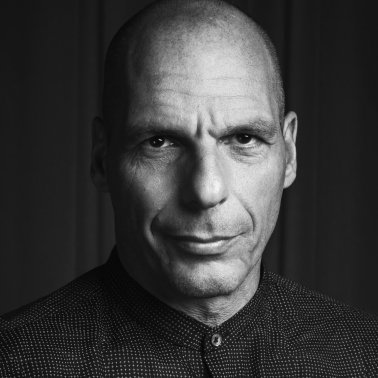Yanis Varoufakis's Blog, page 40
May 20, 2021
Πως ο πατριαρχικός ρεβανσισμός της “Μητσοτάκης Α.Ε.” μετέτρεψε την όμορφη ευχή της συνεπιμέλειας σε κρατική επιβολή του μισογυνισμού
The post Πως ο πατριαρχικός ρεβανσισμός της “Μητσοτάκης Α.Ε.” μετέτρεψε την όμορφη ευχή της συνεπιμέλειας σε κρατική επιβολή του μισογυνισμού appeared first on Yanis Varoufakis.
Austerity’s hidden purpose – Project Syndicate/Katmandu Post
The post Austerity’s hidden purpose – Project Syndicate/Katmandu Post appeared first on Yanis Varoufakis.
May 17, 2021
Πρόσωπο με Πρόσωπο Νο.4: Απαντώντας σε 8 νέες βιντεο-ερωτήσεις σας
 Φρόντισε να είναι καθαρός ο ήχος σου. Προσπαθούμε να αποφύγουμε πολυσύχναστα μέρη, όπου οι γύρω θόρυβοι μπορεί να αποσπούν την προσοχή από την ερώτησή σου.Στην αρχή του βίντεο, δήλωσε το όνομα και την ιδιότητά σου.Η διάρκεια του βίντεο δεν πρέπει να υπερβαίνει το ένα λεπτό. Ερωτήσεις με διάρκεια πάνω από ένα λεπτό, δεν μπορούν δυστυχώς να γίνουν δεκτές.Μπορείς να παρακολουθήσεις ένα παράδειγμα ερώτησης εδώ.Αμέσως μετά, μπορείς να στείλεις το βίντεό σου, με τις παρακάτω free πλατφόρμεςwetransfer.comdatatransfer.grfromsmash.comστο email: face2face@mera25.gr.Ο τρόπος αποστολής του βίντεο είναι απλός: συμπληρώνεις το email σου και το email αποστολής και πατάς send, transfer ή share.
Φρόντισε να είναι καθαρός ο ήχος σου. Προσπαθούμε να αποφύγουμε πολυσύχναστα μέρη, όπου οι γύρω θόρυβοι μπορεί να αποσπούν την προσοχή από την ερώτησή σου.Στην αρχή του βίντεο, δήλωσε το όνομα και την ιδιότητά σου.Η διάρκεια του βίντεο δεν πρέπει να υπερβαίνει το ένα λεπτό. Ερωτήσεις με διάρκεια πάνω από ένα λεπτό, δεν μπορούν δυστυχώς να γίνουν δεκτές.Μπορείς να παρακολουθήσεις ένα παράδειγμα ερώτησης εδώ.Αμέσως μετά, μπορείς να στείλεις το βίντεό σου, με τις παρακάτω free πλατφόρμεςwetransfer.comdatatransfer.grfromsmash.comστο email: face2face@mera25.gr.Ο τρόπος αποστολής του βίντεο είναι απλός: συμπληρώνεις το email σου και το email αποστολής και πατάς send, transfer ή share. Αυτό ήταν! Εμείς παραλαμβάνουμε την ερώτησή σου και σου απαντάμε ότι την λάβαμε.
Αυτό ήταν! Εμείς παραλαμβάνουμε την ερώτησή σου και σου απαντάμε ότι την λάβαμε.The post Πρόσωπο με Πρόσωπο Νο.4: Απαντώντας σε 8 νέες βιντεο-ερωτήσεις σας appeared first on Yanis Varoufakis.
May 16, 2021
Τα ΛΟΑΤ+ δικαιώματα στην Ελλάδα του 2021, η αλληλεγγύη και ο κίνδυνος της αποπολιτικοποίησης – ΑΝΤΙVIRUS
Για την ιστοσελίδα του ANTIVIRUS πατήστε εδώ.
The post Τα ΛΟΑΤ+ δικαιώματα στην Ελλάδα του 2021, η αλληλεγγύη και ο κίνδυνος της αποπολιτικοποίησης – ΑΝΤΙVIRUS appeared first on Yanis Varoufakis.
8 Answers to 8 Questions on Economic Theory, Economic Policy, Humanity & Capitalism – interviewed for The Age of Economics
3. What role does economics play in society? Does it serve the common good?
6. Does economics explain Capitalism? How would you define Capitalism?
The post 8 Answers to 8 Questions on Economic Theory, Economic Policy, Humanity & Capitalism – interviewed for The Age of Economics appeared first on Yanis Varoufakis.
Techno-Feudalism & the End of Capitalism – interviewed by Alice Flanagan for NOW THEN
We spoke ahead of Yanis’s online talk for Sheffield’s Festival of Debate on 7 May.
What prompted you to jump genres in this way?
For decades, I was avoiding writing a book by which to answer the question, ‘Well mate, if you don’t like capitalism, what’s the alternative?’ I was avoiding that question like the plague, because it’s just so hard to indulge oneself in writing a modern utopia. Yet another utopic book.
But at the same time I felt the need to answer the question, because we tried Marx’s way. Marx never spoke about communism. He declared himself a communist, and spent all his life describing capitalism, but he never ever, not once did he describe communism. When he was pushed remorselessly, he came up with a nice slogan, which was “from each according to their capacities, to each according to his needs.” Ok great, but how does this work?
So he said it’s for the revolutionaries to decide what the world will look like. Well, that didn’t turn out very well, because you know, Stalin created the gulag and threw communists in it to begin with, before everyone else joined them.
And today, especially with young people who don’t give a damn about the left, or about politicians or political parties, trade unions even, if there’s any chance we can mobilise them to get involved in planning an alternative to the dystopic present and future ahead of us… Well there isn’t, unless we can offer them something worth fighting for, a vision of a society that might take hard work to construct, but will be worthwhile doing.
WE MISSED OUR MOMENT TO STEER THE SOCIO-ECONOMIC PROCESS IN A COMPLETELY DIFFERENT DIRECTION
And then it hit me at some point that the only way I could write it was as a political science fiction novel. Both the novel and the science fiction were important. The science fiction, because I didn’t want to write something like, ‘In the future, we can do this that and the other.’
The ‘other now’ comes from my generation’s great failure: the response to 2008. That was a dismal moment for capitalism. Capitalism was imploding, far worse than it is today, and we missed our chance. We missed our moment to steer the socio-economic process in a completely different direction. So I thought it was useful to imagine how we would have done that, with the benefit of hindsight.
And then the novel part comes in because of the problem I have, that I disagree with myself on how a democratised socialist world should work. I’m not sure.
So the best way of capturing that uncertainty was to have different characters, each one of them expressing my views. In this way I can relay to the reader that I am in conflict with myself.
 The parallel economy you describe takes a form you call ‘corpo-syndicalist’, one marked by “markets without capitalism” and Universal Basic Income. Is UBI the way forward?
The parallel economy you describe takes a form you call ‘corpo-syndicalist’, one marked by “markets without capitalism” and Universal Basic Income. Is UBI the way forward?The first ingredient isn’t UBI; it’s the end of tradable shares. The idea that Rupert Murdoch can buy the shares of any newspaper in the world, and effectively turn them into his own mouthpieces, is absurd.
I mean, if that was not the case, and I came to you and said, ‘Look, I have an idea. Let’s chop up into tiny little pieces the ownership rights to every company, and then let’s trade those freely and allow the very rich to buy all the corporations,’ you would think that I am mad. That I am mad and dangerous. Yet this is what we have.
So moving from the oligarchic ownership model, where you buy as many votes… and this is how you should think of shares; shares are votes! And they are the votes in the assemblies where serious decisions are made. The serious decisions are not made in the Houses of Parliament. They are not made in the Congress or the Bundestag. They are made in the boards of directors and the general assemblies of Goldman Sachs, of Volkswagen, of Google, and so on.
This is where the big decisions are being made, the decisions that determine your life, as well as life on the planet. So these are the votes that count. And to say that there is a market for votes and the rich can buy them is the end of democracy. The democracy we have is simply a piece of propaganda. We have an oligarchy with elections and the elections are bought by the oligarchy.
So the first part is ‘one person, one share, one vote.’ That’s a very radical part, but also so simple. That’s what attracts me to it, that it is such a simple idea, and it’s what we already have in the political sphere. You have one vote; you can’t sell it, you can’t rent it, you can’t buy more. You just exercise it.
THE FIRST INGREDIENT ISN’T UBI; IT’S THE END OF TRADABLE SHARES
Number two is a digital bank account that everybody has with a central bank. Because at the moment you can have a bank account at the Royal Bank of Scotland or Barclays, but you cannot have a bank account with the Bank of England. But the Royal Bank of Scotland and Barclays do have a bank account with the Bank of England, which means that when the central bank is printing money, they can’t give it to you, they give it to them. And [the commercial banks] give it to the large corporations, who take that money and go buy shares. This is what we have now!
So the first thing you do is ban the trading of shares and say one share per employee, and the second thing you do is you cut out the middleman. Suddenly everything changes. Everything.
Firstly, you will never have a bank account with Barclays. Why would you want one? Why would you need one? You wouldn’t. You would have an account with the state central bank. Digital, with a smartphone app, with a plastic card.If that happens with everyone in Britain, with everyone in the Eurozone, and so on, everybody has one row of a spreadsheet. That’s what the central bank will be. Well, if that is the case, why can’t the Bank of England then give you £1,000? To each of you, just add them to every row. That’s UBI for you!
You see, I was never in favour of UBI when it came out. I’m old enough to have been involved in the debates over UBI in the 1980’s and I was not a supporter of the idea. I was not a supporter of it because the idea then was it would be funded by taxation. I don’t like this idea. At all.
Because if you go to a hardworking blue-collar person, and you say to them, “I’m going to tax you and give the money to someone who does nothing, or to a rich person,” they say, “What? You are going to tax me in order to give money to someone who doesn’t need it, or who doesn’t deserve it?” Then the whole thing becomes toxic.
[Instead] you say to them, ‘Look, everyone takes it, because we are on this spreadsheet, and it’s just numbers and we add it on every month.’ And to the extent that these numbers facilitate economic activity, you dont have inflation, because there’s more stuff that has been produced.
Anyone who says to me that universal basic income means people will not be motivated to work, I say, what?! Zuckerberg has billions! And he works day and night, you know? The rich never say this about their kids. They never say, ‘Oh no, he shouldn’t have a trust fund. If they aren’t starving they won’t be motivated.’ Only about the poor do they say this.
I CALL IT TECHNO-FEUDALISM. I DON’T CALL IT CAPITALISM ANYMORE
You say that, in the universe where capitalism survives past 2008, this pandemic only serves to deeper entrench capitalism, the same way the crisis did. Do you see things going that way?
I call it techno-feudalism. I don’t call it capitalism anymore. We need to distinguish what was going on before 2008 from what was going on after 2008.
Amazon is not a market; it’s a fiefdom. And it’s a fiefdom that’s connected to other fiefdoms, like Facebook, through the cloud services of Amazon, which are much greater and bigger than Amazon.com. It’s like a much more technologically advanced form of feudalism.
And this is completely sustained by central bank money. So you have the combination of the king, the sovereign, the state, the central bank and the feudal lords, the techno-feudal lords.
You can see that this system is constantly doubling-down on our extinction as a species. We had the pandemic and what did they do? More of the same. They give them more money. They give it to the same people.
They gave some money to the people in furlough wages and so on, but that is only temporary. There’s been no real investment in human capital; in students, in cancelling debt. They’re not doing any of that.
They have no problem plucking the money tree for themselves. Sometimes they spread some of the money they plucked from the money tree to the many, but in a limited and transient manner. And the stagnation of the capitalist system, the techno-feudalist system as I call it, gets more and more entrenched.

How do we get from here to there, ‘there’ being the ‘other now’?
You know, of course, what Bernstein said when he was in New York and someone asked him how to get to Carnegie Hall? ‘Practice, practice, practice!’
The equivalent here is ‘organise, organise, organise!’ We need a political movement. In the chapter ‘How Capitalism Died’, I’m not saying this is what we need to do, but I give an example of what might work. It’s my best attempt to show the enormity of the task, but also the feasibility of it.
As long as we combine traditional forms of action – democratic politics, financial engineering, consumer boycotts using the power of the internet – with having a very clear plan in our heads as to how we want things to work. What do we do with corporate law? I am proposing one share, one vote. What do we do with money? Well, we discussed some of that.
Let’s say we were to say on the first of May, let’s have a day of action and boycott Amazon just for one day with this demand: a substantial pay rise for workers. And we organise internationally, and we manage to reduce sales on Amazon by 8%. I’m not saying 80% – just 8%.
Well, Jeff Bezos is going to lose a little bit of money that day, but not much. But if we publicise well and we are so successful as to reduce that amount of sales, the share price is going to go down.
Jeff Bezos is getting rich not because of the profits of Amazon, but because of the increase of the share price. You’ve heard that he made what, $60 billion since the beginning of the pandemic? That’s not because of the profits of Amazon. Amazon is not that profitable. They have huge revenues, but they also have costs. The actual profits are nothing like that. It’s maybe one billion altogether, but he made 60! From the share price.
So if we hit the share price, through this kind of international action, you’ve really hit him.
I’M OLD FASHIONED. CALL IT PROPAGANDA!
So the revolution needs a good publicist – is that what you’re saying?
I call it propaganda. I hate the word ‘publicity’, especially the word ‘communications’. I’m old fashioned. Call it propaganda! They have propaganda; we need our propaganda.
The powers-that-be present their propaganda as the truth and their opponents’ propaganda as propaganda. But it’s all propaganda! Progressive propaganda versus regressive propaganda. Propaganda which is good for your mind, which tells the truth.Anyway, I just can’t stand those advertising PR people who constantly talk about ‘communication’. You’re not interested in communicating anything. You’re interested in brainwashing people.‘Communication’ is very neutral, like me telling you tomorrow it’s going to rain. That’s not what their job is. Their job is to turn you against your self interest, and community interest.In your alternate universe, global capitalism is brought down by a movement with its origins in a utilities strike in Yorkshire. Was there a particular reason you chose us?Oh yes. Everything I have done in this book is autobiographical. I moved to England in 1978 and the first strike I was involved with was a steel plant in Yorkshire. I was participating in a picket line there. So that’s why – it was my first personal involvement in the movement.I’ll admit I was hoping the answer would be, “Ok, I’ve worked it out, and if we can get just Yorkshire to strike…”Yes, there is one other reason! The Yorkshire water company was, immediately after privatisation, one of the worst. And I think it would be good to target them.I find it impossible that a place like Yorkshire, which was drenched in rain, had water shortages. It takes a real cock-up to make that happen.For the NOW THEN site, please click here
The post Techno-Feudalism & the End of Capitalism – interviewed by Alice Flanagan for NOW THEN appeared first on Yanis Varoufakis.
From the peculiar failure of economic theory to capitalism’s transition to technofeudalism: A discussion with Ilan Pappé
For more details on the event, please visit the University of Exeter website here.
The post From the peculiar failure of economic theory to capitalism’s transition to technofeudalism: A discussion with Ilan Pappé appeared first on Yanis Varoufakis.
May 15, 2021
Debating the EU with Douglas Murray on UNHERD – video
The post Debating the EU with Douglas Murray on UNHERD – video appeared first on Yanis Varoufakis.
mέta is here! (DiEM25’s Centre for Postcapitalist Civilisation) Read about its purpose & watch our digital launch
Website: mέta – Centre for Postcapitalist Civilisation
The post mέta is here! (DiEM25’s Centre for Postcapitalist Civilisation) Read about its purpose & watch our digital launch appeared first on Yanis Varoufakis.
To mέta είναι εδώ – το Κέντρο για τον Μετακαπιταλιστικό Πολιτισμό που ίδρυσε το ΜέΡΑ25
Ιστοσελίδα: mέta – Κέντρο Μετακαπιταλιστικού Πολιτισμού
The post To mέta είναι εδώ – το Κέντρο για τον Μετακαπιταλιστικό Πολιτισμό που ίδρυσε το ΜέΡΑ25 appeared first on Yanis Varoufakis.
Yanis Varoufakis's Blog
- Yanis Varoufakis's profile
- 2451 followers



